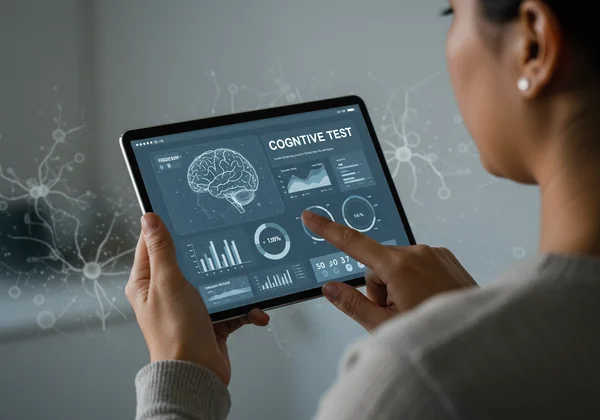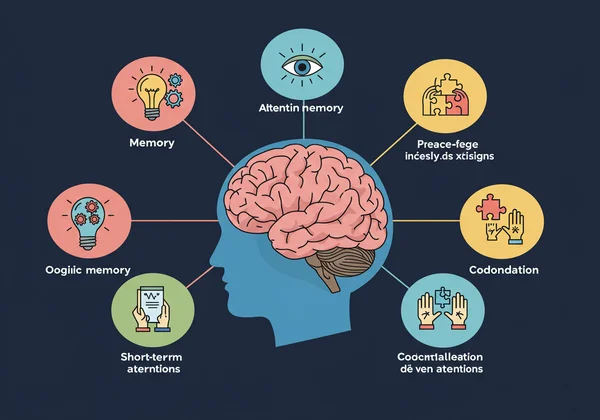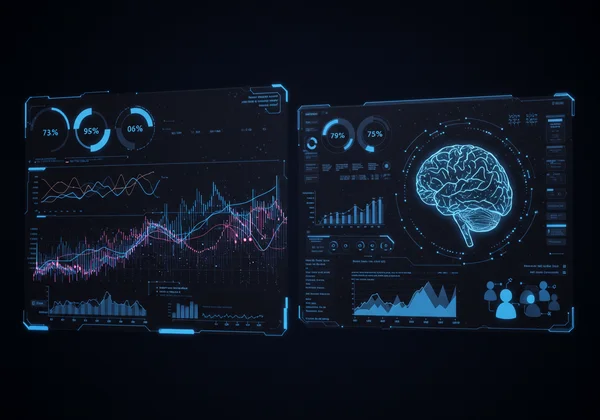Your Cognitive Test Report: Scores, AI Insights & Next Steps
August 10, 2025 | By Audrey Fletcher
Receiving a detailed analysis of your cognitive function can feel both exciting and a little overwhelming. You've completed the assessment, and now you have a report filled with scores, charts, and information. Understanding this data is the first step toward empowerment on your brain health journey. So, what does a cognitive test consist of? More importantly, what do your results truly mean for you?
This guide is here to walk you through your cognitive test report from our platform. We'll make sense of the scores, explain the powerful AI-driven insights, and outline clear, actionable next steps. Our goal is to transform your report from a set of data points into a personal roadmap for understanding and supporting your cognitive wellness. Let's begin your cognitive health journey to clarity and confidence.

How to Interpret Your Cognitive Test Report
Consider your cognitive test report a detailed map of your unique mental landscape. This isn't about a simple pass or fail grade; rather, it's a profile that highlights your strengths and identifies areas that might benefit from more attention. The report is designed by neuropsychologists and data scientists to be comprehensive yet understandable, giving you a holistic view of your brain's performance.
This scientifically-backed assessment moves beyond simple brain games to provide a reliable snapshot of your cognitive abilities, leveraging principles found in established neurocognitive evaluations from institutions like the National Institutes of Health (NIH). It serves as a powerful screening tool to help you understand your current cognitive state and monitor it over time.
What a Report Consists Of
Your comprehensive report is structured to guide you from a broad overview to specific details. Typically, you will find a summary of key findings, a detailed breakdown of your performance across different cognitive domains, and personalized insights. This structure allows you to digest the information at your own pace, whether you're looking for a quick summary or a deep dive into a specific cognitive function test. Each section builds on the last, creating a complete picture of your cognitive profile.
Understanding the 22 Cognitive Skills Measured
One of the core strengths of this assessment is its comprehensive nature. Unlike many online tests that measure only one or two skills, our platform evaluates 22 distinct cognitive skills. This provides a rich, multi-faceted view of your brain health. These skills are grouped into key domains, including:
- Memory: Covering abilities like Short-Term Memory, Verbal Memory, and Working Memory.
- Attention: Assessing skills such as Focused Attention, Divided Attention, and Sustained Attention.
- Reasoning: Evaluating your Planning, Processing Speed, and problem-solving abilities.
- Coordination: Measuring skills like Hand-Eye Coordination and Response Time.
Understanding your performance in each of these areas helps create a much more nuanced and accurate picture than a single, generalized score ever could.

Decoding Your Cognitive Assessment Results
Now, let's dive into your scores. The numbers and percentiles in your report are valuable tools for self-reflection and conversation, especially when you understand the context behind them. It's natural to want to know where you stand, and this section will help you do just that.
What is a "Good" Cognitive Test Score?
This is one of the most common questions people have, and the answer is that there isn't a universal "good" score. Your performance is evaluated relative to a large database of individuals in your same age group. This means your results are presented in a way that shows how you performed compared to your peers, which is a much more meaningful measure than an arbitrary number.
Instead of focusing on "good" or "bad," it's more helpful to view your report as a personal baseline. It’s a starting point from which you can track your cognitive journey. Consistent performance or improvement over time is a fantastic indicator of stable brain health. An online cognitive test like this is your first step to establishing that baseline.
The Power of AI-Enhanced Personalized Insights
This is where our platform truly stands apart. Beyond the raw scores, we use artificial intelligence to generate personalized insights. When you choose to provide anonymous background information, such as age and education level, our AI can conduct a deeper analysis. It identifies patterns and connections within your results that might not be immediately obvious.
This AI-enhanced analysis translates complex data into actionable advice. For example, it might connect a lower score in planning with its potential impact on daily tasks like managing finances or organizing projects. It then provides tailored suggestions for strengthening that cognitive skill. This feature transforms your report from a static document into a dynamic guide for cognitive improvement.

Interpreting Score Ranges and Percentiles
Your report will likely use percentiles to show your results. A percentile is a score that indicates the percentage of people in a reference group that you scored higher than. For example, if your score for Focused Attention is in the 70th percentile, it means you performed better in that area than 70% of people in your age group.
Viewing your scores as a range or profile, rather than isolated numbers, is key. Everyone has natural cognitive strengths and weaknesses. Perhaps you excel in creative problem-solving but have a harder time with short-term memory. This is completely normal. Your report helps you identify this unique pattern, allowing you to leverage your strengths and support your challenges.
What if Your Cognitive Test Scores Show Challenges? Next Steps
Seeing lower-than-expected scores in certain areas can be concerning, but it's important not to panic. Your report is a tool for awareness and action, not a final judgment. It provides valuable information that empowers you to take proactive steps toward supporting your brain health.
When to Seek Professional Medical Advice
This is a crucial point. Our assessment is a powerful screening tool, but it is not a substitute for a professional medical diagnosis. We strongly encourage you to share and discuss your report with a doctor or a qualified healthcare professional, especially if:
- You have significant concerns about your results.
- Your scores reflect a noticeable decline from a previous test.
- You or your family have observed changes that impact your daily life, such as difficulty with conversations, managing tasks, or remembering important events.
Your report can be an invaluable tool for starting a productive conversation with your doctor, providing them with objective data to inform their evaluation.
Proactive Strategies for Supporting Your Brain Health
Your report can highlight specific areas to focus on. Regardless of your scores, adopting a brain-healthy lifestyle is one of the most effective ways to support your cognitive function. Evidence-based strategies include:
-
Physical Exercise: Regular activity increases blood flow to the brain.
-
Balanced Diet: A diet rich in antioxidants and omega-3s supports brain health.
-
Quality Sleep: Sleep is essential for memory consolidation and cognitive restoration.
-
Mental Stimulation: Challenge your brain with new hobbies, puzzles, or learning a new skill. The tasks in a cognitive skills test are a great example of mental stimulation.
-
Social Engagement: Staying connected with others is strongly linked to cognitive resilience.

Utilizing Your Report for Long-Term Monitoring
Your first cognitive test report is your baseline. The true power of this tool unfolds when you use it for long-term monitoring. Taking the test periodically—perhaps every 6 to 12 months—allows you to track changes over time. This can help you see the positive impact of your lifestyle changes or provide an early warning if your cognitive function is declining.
By tracking your performance, you move from a one-time assessment to an ongoing practice of cognitive self-care. It’s an empowering way to stay engaged with your brain health and make informed decisions for your future. You can always return to track your progress and see how you are doing over time.
Your Path Forward: Empowering Cognitive Health
Your cognitive test report is far more than a collection of scores; it's a personalized key to understanding your own mind. It empowers you with the knowledge to identify your unique strengths, recognize areas for improvement, and take proactive steps toward lifelong brain health. By providing a comprehensive, scientifically validated, and AI-enhanced profile, this report serves as your trusted partner on this journey.
Ready to gain a deeper understanding of your own cognitive profile? Take the free cognitive test today and unlock the personalized insights that can guide your path to better brain health. We invite you to share your thoughts or questions in the comments below!
Frequently Asked Questions About Your Cognitive Test Report
What does a cognitive test measure?
A comprehensive cognitive test, like the one offered on our platform, measures a wide range of mental abilities. This includes memory (short-term, long-term, working), attention (focused, divided), reasoning, problem-solving, and processing speed. Our test specifically evaluates 22 distinct skills to provide a holistic and scientifically grounded view of your cognitive health.
What is considered a "good" cognitive test score?
There is no single "good" score. Performance is relative and compared to others in your age group using percentiles. The most important goal is to establish a personal baseline. A "good" outcome is understanding your unique cognitive profile—your strengths and areas for focus—and using that information to support your brain health over time.
What should I do if my cognitive test results show concerns?
If your results cause you concern, the first and most important step is to discuss them with a healthcare professional. Your report is a valuable screening tool that can facilitate a more informed conversation with your doctor. It is not a diagnosis. Use the report as a starting point for seeking professional guidance.
How is this platform different from other online cognitive tests or brain games?
Our platform stands apart in three key ways. First, it is scientifically validated, with its design principles rooted in established neuropsychological assessments like the CogniFit (CAB)® and Woodcock-Johnson (WJIV COG), which are widely recognized in the field as detailed by sources like the American Psychological Association (APA). Second, it is comprehensive, assessing 22 cognitive skills, whereas most brain games target only a few. Finally, our platform uses AI to provide personalized, actionable insights that go beyond simple scores, making your cognitive assessment results easy to understand and act upon.